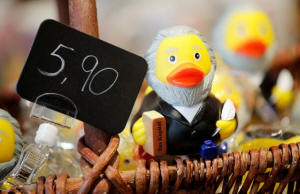|
Marx's best known and most influential works are the Communist
Manifesto, co-written with Friedrich Engels and released in
1848, and his caustic analysis of capitalism "Das Kapital" two
decades later.
"The souvenir plays on Marx's criticism of capitalism and of
course the 0-euro note fits perfectly with Marx as a motif,"
said Norbert Kaethler, managing director of Triers' tourism
office.
He pointed out that Marx did not earn much from his theories and
had to live in poverty for several years of his life.
Trier's tourism office said it had already sold 5,000 of the
purple notes, which resemble genuine euros but are labeled
"souvenir", and was printing 20,000 more. They are on sale at
the Porta Nigra, the southwestern German city's most famous
landmark and one of the largest Roman gates north of the Alps.
Marx, who forecast that capitalism would be superseded by
socialism, spent the first 17 years of his life in Trier. The
city is proud of its most famous resident though some Germans
blame his ideas for the rise of Communist dictators in Russia,
China and Cuba and the Cold War division of their country.
The city is making the most of his 200th birthday on May 5.
Other memorabilia include a bearded Karl Marx rubber duck with
an edition of Das Kapital tucked under one wing.
Trier is also unveiling a giant three-tonne bronze statue of
Marx, a gift from the Chinese government, despite concerns from
critics about China's alleged human rights abuses.
(Reporting by Madeline Chambers; Editing by Mark Heinrich)
[© 2018 Thomson Reuters. All rights
reserved.] Copyright 2018 Reuters. All rights reserved. This material may not be published,
broadcast, rewritten or redistributed.
Thompson Reuters is solely responsible for this content.

|
|







